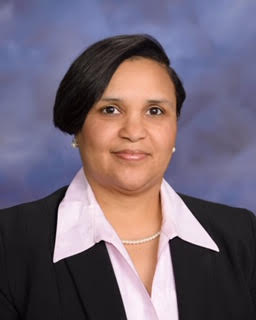‘It’s All About the Relationship’: What One Indianapolis School Leader Says She’s Learned About How School Choice Empowers Parents to Engage With Their Schools — and Hold Them Accountable

School choice is personal for Kelli Marshall, CEO of Tindley Accelerated Schools, an Indianapolis network of charter schools serving predominantly African-American students.
Marshall attended Indianapolis Public Schools in her early years before switching to a parochial school. As she moved through school, eventually graduating from Indiana University, she saw fewer and fewer African-American classmates with each passing year. That reality is what prompted her to devote the bulk of her career to working with children of color in Indianapolis.
“I wanted to pass on what was so easily passed on to me,” she told The 74.
Marshall worked as a teacher and principal in Indianapolis Public Schools for 16 years before moving into the charter sector. She became a principal at Tindley Collegiate, an elementary school, in 2012 and was promoted to CEO of the network in 2016.
Tindley Accelerated Schools, which has five schools serving grades K-12, is known for high test scores and the bold motto “College or Die.” It also has a strong emphasis on parent involvement, which Marshall says is the key to its success.
“I am a firm believer that schooling should be an extension of home,” said Marshall, whose own children have attended both Indianapolis public schools and charter schools because she wanted to expose them to different environments and communities.
Marshall noted that the school choices available in her city empower parents to be engaged in their children’s education and to hold schools accountable.
“I’m extremely excited about what’s happening in Indianapolis, because it is putting options at the fingertips for parents,” she said, pointing to Enroll Indy, the new citywide common enrollment system. “I can’t say that I am 100 percent bought into Enroll Indy yet, but I will say that it is exposing parents to a variety of opportunities that parents would not have known were out there. … Indianapolis has taken the necessary steps to put that choice out there in front of parents, so that they do have a say-so in where they are sending their kid, and it’s not just dictated by their address.”
Marshall will join four other African-American education leaders on a panel Sunday evening in Indianapolis for a town hall called “School Choice Is the Black Choice” hosted by The 74 and journalist Roland Martin. Learn more about the event here.
This interview has been lightly edited for length and clarity.
The 74: You’re speaking on a panel this weekend called “School Choice Is the Black Choice.” What has that idea meant to you personally and professionally?
Marshall: I would say, personally, being an African American, it definitely rings home as true because I was blessed and fortunate enough to have access that I would just want for all students, no matter their race or color. But I do know, working in a predominantly African-American environment, that those resources and that access isn’t always made readily accessible. So when given the opportunity … to actually sit alongside people in education and school leaders to talk about it, I just definitely wanted to jump on it. It rings true, it really does.
For me, I came up in a two-parent household, fortunate and blessed enough to attend Indianapolis public schools, but then I transitioned into a parochial school environment where I had an amazing education. But I looked at my classmates, and then as I continued to transition on to Indiana University, and I started to see fewer and fewer faces like mine, and so I was determined that when I had my own kids, I would do what I could to expose them to a variety of school settings.
What makes Tindley schools different?
What people would call our discipline policy, I refer to as habits of opportunity — we’re unapologetic about holding parents accountable to being involved in their child’s education, and when we have the extended day and the mandatory Saturdays, or we’re saying to a parent, “I need you to sit in with your child,” what we’re saying is, “I need you along on this child’s journey.” Because we’ve proven that if that parent is involved … then that child is more likely to be successful.

People always ask, “What’s the secret sauce at Tindley?” It’s not the disciplinary policy. It’s the intentional forced involvement that we have for parents. Because if you enroll your child into Tindley, you are going to hear from us — we are going to show up at your doorstep. We’re going to hold your kids there until we see you. And in my experiences in other settings, that has not necessarily been the case.
The open-door policy is the other thing. We encourage parents that as long as you can pass our security and our lobby guard, and you have no current or outstanding issues of safety, then we welcome you into those classrooms every single day.
What’s the most important advice you have for your students?
Always remember who you are, and then continue to lift and build yourself as well as lifting and building those who are coming behind you.
Tindley students know that I expect them to leave a legacy no matter where they go. They also know that I expect them to win. And that’s something that I will say every day when I see them. If I say to a Tindley scholar, “You’re destined for what?,” they know it’s greatness. That’s just the response.
How do you know students have internalized that message they’ve been hearing from you?
A couple of things: When they question what’s going on with them academically, and that can come in the form of even asking a teacher, “Hey, I don’t have great grades in the gradebook this week” … And when they reach back to a classmate either alongside them or behind them and offer some advice. That’s when I know the capacity is established. That’s how I know when they’ve bought in.
How do you find and retain talented teachers for your schools?
We’re getting better! Let me tell you: We were absolutely horrible with this, we were burning teachers out too quickly, and I think I was part of the problem, because it’s results — student outcomes will determine whether or not you stay on with us. We have transitioned into a culture of growth and development, and honestly, that is through the supports of everything that is happening in Indianapolis, and it’s better, it really is. Establishing those strong partnerships with Teach for America, TNTP, and hopefully soon Relay Teacher Residency.
Before, as a veteran educator, we used to frown upon anyone who wasn’t traditionally trained. And now, the world is changing so drastically, and the candidate pool is becoming so, so slim, that it works better when you bring folks in and you train and lift them up and then also seek out those leadership qualities within them. I’m appreciative of how many leaders have come out of Tindley.
You are one of a pretty small group of network leaders and charter leaders who are African American — what does that mean to you, and what does that mean for your scholars?
I think we just want to be thought of as strong network leaders and students. It means something to us as far as our pride and all of that, but we move in a space where we are literally just trying to be the best that we can be no matter what. And it sounds extremely cliché, but my kids don’t look and say, “Hey, we’re the only black school that is doing this on the east side of Indianapolis.”
What we look at is, who is the highest-performing school out there, and what are the colleges that are the hardest to get into, and we shoot for them.
Tindley has been undertaking efforts to decrease suspensions and loosen some discipline practices in recent years. What is your approach to school culture, and what role does discipline play in it?
When I came into the Tindley culture, we had not yet started expanding into the elementary grades, and so as a middle school principal I found the policies to be appropriate. As we started then to look more closely at the elementary years and especially as I transitioned in as superintendent, and I’m walking the buildings and I’m looking at some of the policies, I didn’t believe — just having an elementary degree — that they were age-appropriate.
My first year, I spent a lot of time talking to parents and I established a parent advisory council because I wanted to hear the answers to “How are you expecting us to support your scholar?” Because, again, I am a firm believer that schooling should be an extension of home as well. And so what I was hearing from parents was that they weren’t necessarily against the rules, they were against the harsh penalties tied to the consequences. And so what we did, again, got parent involvement, got student involvement, got teacher involvement, and what we did was we looked at how can we offer multiple opportunities for the parent to engage or for the teacher to re-engage before we institute a suspension. And in some cases it’s working. In our October board meeting, what I heard from parents is, “Hey, now you’re giving kids too many chances.” So we’re trying to find that balance.
The schools within our network that are doing the best at it are the ones where all of the leaders and all of the teachers have the better relationships with the parents. It’s all about the relationship. When a parent trusts you and that leader says, “Hey, they’ve got to go home for three days,” I was able to leverage that handbook for the benefit of the student, not to be punitive. And the other thing that I always like to mention is, I’ve been in other environments — again, great teaching, I’ve learned a great deal — but they weren’t always safe.
Get stories like these delivered straight to your inbox. Sign up for The 74 Newsletter

;)
